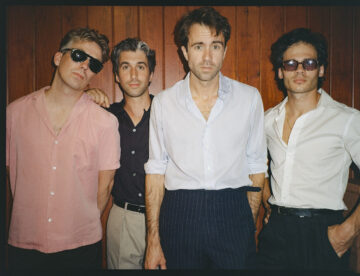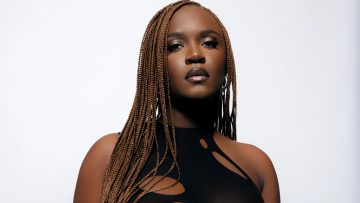★★★★☆
Coercion has, sadly, been an all-too-common occurrence in music’s history. Many cases don’t just pit individuals against each other but show how, when the artist is the product, the machinery of an entire industry will seek to dictate the lives of those it profits from too. And three cases over the past decade-and-a-half, all involving female artists, demonstrate just how destructive and prevalent this still is.
Taylor Swift’s forthcoming Speak Now release will mark the midpoint of her bid to re-record, and thereby own the rights to, her entire catalogue, after it had previously been sold by her ex-manager Scooter Braun in a $300 million (£240 million) deal. Eighteen months ago, meanwhile, an L.A. judge approved the end of Britney Spears’ 14-year-long conservatorship, freeing the noughties pop queen from the abhorrent control of her father, who reportedly forced her to take medications and perform against her will.
Whilst some of the anguish of both those cases no doubt remains, they have on the whole been resolved. Kesha’s lengthy legal wranglings with Lukasz Gottwald, aka Dr. Luke, however – which came to a head when the singer dropped a lawsuit against the producer in 2014, citing sexual, physical, verbal, and emotional abuse (allegations Gottwald has repeatedly denied) – remain ongoing.

We’ve had glimpses before of what artist the popstar could be beyond the ‘TiK ToK’-singing party-girl image first bestowed on her since she signed with Dr. Luke’s Kemosabe Records aged 18. But her latest album Gag Order is by far her most liberating, creatively daring to date.
Where 2017’s Rainbow – with its gospel-soaked lead single ‘Praying’, performed so emphatically at the 2018 Grammys – was an unleashing of everything Kesha felt she needed to get off her chest, Gag Order is her emotional reckoning, where she finds peace and solace in her artform.
The organ opener on ‘Something To Believe In’ calmly clears the air, before big beat synths entwine with Kesha offloading her angst, “Mind’s been racing like a stallion / While I watch it all collapsing”. The largely minimal approach marks from the get-go that Gag Order has received the full Rick Rubin treatment – a producer who coaxes out only the essential elements of his collaborators.
At a recent Q&A hosted by Dazed, Kesha revealed just how elemental Rubin’s approach was. ‘Eat The Acid’, for instance, even uses voicenotes she’d recorded on her phone and sent to him; not that you’d notice, with the track’s whirring resonance and talk of spiritual reconciliation (“I am the one that I’ve been fighting the whole time / Hate has no place in the divine”).

Acoustic number ‘Living In My Head’ typifies how Gag Order leans far more toward artistic expression than commercial pursuit, sharing more of a musical cousin with Feist than any formulaic popstar. The bracing admittance of “I’m so fucking insecure / I just can’t stand it / God I hate myself / Sometimes I can’t get out my head”, however, is perhaps more in-tune with the self-loathing sentiment of Kanye West’s Ye (incidentally, the album that followed Rubin’s two-run album spell with the castigated rapper).
This is where the album could fall short, with its theme of self-punishment bordering on incessant. ‘Hate Me Harder’ sees Kesha beckon someone to despise her. (In the same way ‘Praying’ was a veiled message against Dr. Luke, lines here of “You say I’m obnoxious / Nobody was asking” will be considered aimed in the same direction). Likewise, beneath its sci-fi rumblings, the sense of personal loss on ‘Too Far Gone’ is almost irredeemable at times, as the singer laments she’s “killed the part of me that I like”.
But there are, thankfully, moments of relief, lifting the plastic bag that adorns the singer’s head on the album cover, allowing life and a space to breathe. This isn’t in the form of pure pop ecstasy, though (Rubin reportedly persuaded Kesha not to just have an album “full of bangers”); only the controlled, auto-tuned screaming on ‘Peace & Quiet’ and Renaissance-esque ‘Only Love Can Save Us Now’, with its gospel, boss-girl attitude, can really lay any claim on that.
Instead, Zen reflections are sampled, from the likes of Indian philosopher Osho, who opens the breathy ‘All I Need Is You’, whilst ‘Ram Dass Interlude’ provides a moment’s meditation from the spiritual teacher, ending with the mother of all ideals: “You’d rather be vulnerable and hurt than living dead.”
Perhaps the album’s greatest emissary is ‘The Drama’. Over plodding synths, it delves into the emotional angst Kesha’s experienced in recent years – “the paranoia… / Swimming in my head like a Great White” – before its crescendo caves-in on itself and the singer is left hoping that “In the next life I wanna come back as a house cat”. It’s honest, it’s bold and, frankly, it’s more than fair enough.
Of course, the irony of the album being called Gag Order isn’t lost. Kesha might have felt silenced in her actions, creative or otherwise, for the best part of a decade, but on her latest projects she strives to push herself as far as she’s ever been.
“Even though it sounds miserable,” Kesha added at the Q&A, “I’m the happiest I’ve ever been in my life”. The final track – a sweeping, emotive outro which opens with a sample from Kesha’s friend who just so happens to be a wizard – is aptly-titled ‘Happy’. Gag Order works through the singer’s turmoil to reach this state, bringing its listeners through that most human of processes.
Gag Order is out 19 May via RCA Records.






1 Comment
I loved this review. And loved this sentence “Gag Order leans far more toward artistic expression than commercial pursuit”. This is why I’m obsessed with the album. Great job, Kesha and Rick!